Transition into the 21st Century: Looking Back at the James S. McDonnell Centennial Fellowships
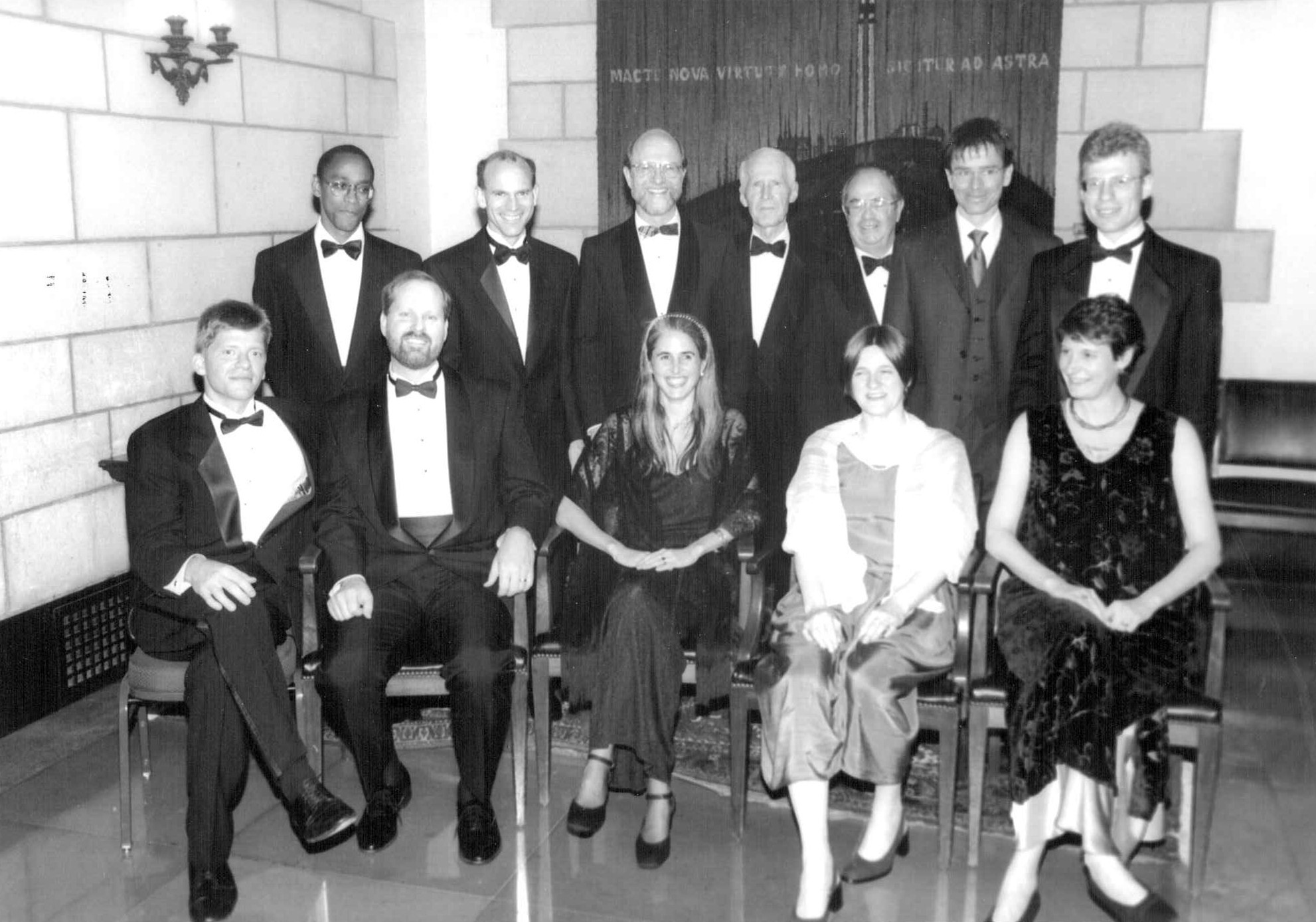
As the new millennium approached, the James S. McDonnell Foundation looked to commemorate two significant moments: what would have been founder James S. McDonnell’s 100th birthday, in 1999, and the Foundation’s 50th anniversary in 2000. JSMF staff decided to award $1 million centennial fellowships to young scientists from around the world whose work had the potential to contribute substantially to scientific knowledge in the 21st century.
After four years of planning and implementation, JSMF selected 10 scientists working in five fields that reflected Mr. Mac’s diverse interests: astrophysics and cosmology, human genetics, global and complex systems, human cognition, and the history and philosophy of science.
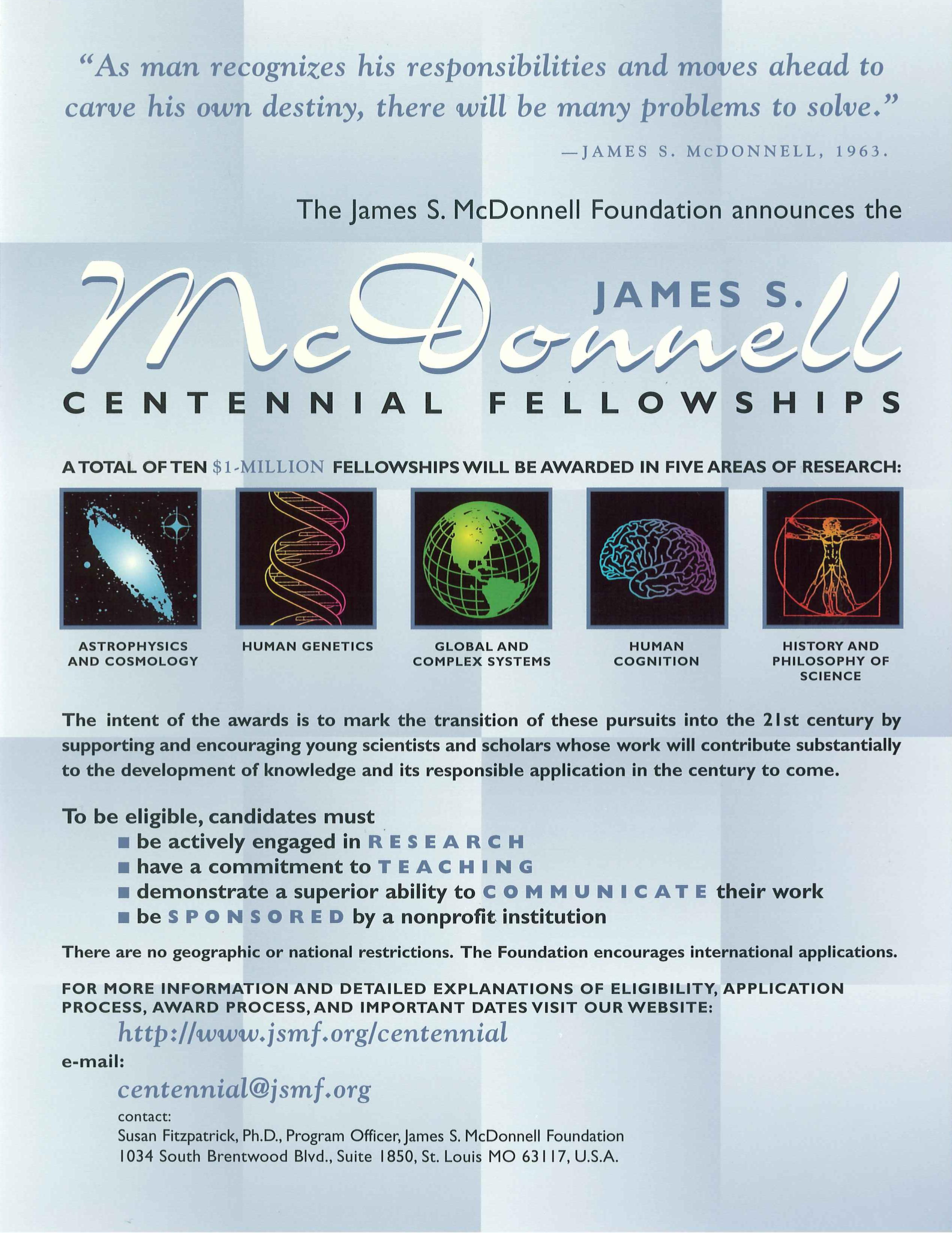
The intent of the awards is to mark the transition of these pursuits into the 21st century by supporting and encouraging young scientists and scholars whose work will contribute substantially to the development of knowledge and its responsible application in the century to come.
The winners, announced at the end of 1998, had an array of research interests, from climate modeling to color vision to mapping the human genome. Recipients included:
- Dr. Kathleen Akins at Simon Fraser University
- Dr. Wendy Bickmore at the University of Edinburgh’s MRC Human Genetics Unit (Western General Hospital)
- Dr. John Carlstrom at the University of Chicago
- Dr. Stanislas Dehaene at the French National Institute for Health and Medical Research (now at the Collège de France)
- Dr. Leonid Kruglyak at the Fred Hutchinson Cancer Research Center (now at the University of California, Los Angeles)
- Dr. Mercedes Pascual at the University of Maryland Institute Center for Marine Biotechnology (now at New York University)
- Dr. Daniel Povinelli at the University of Louisiana at Lafayette
- Dr. Stefan Rahmstorf at the Potsdam Institute for Climate Impact Research
- Dr. Christopher Stubbs at the University of Washington (now at Harvard University)
- Dr. Keith Wailoo of the University of North Carolina at Chapel Hill (now at Princeton University)
A quarter century later, here’s a look back at the experience of several McDonnell Centennial Fellows, the impact of their research, and the legacy of the awards.
Applying for the Centennial Fellowships
In addition to being outstanding researchers, the fellows were selected for their ability to effectively communicate the significance of their work to the general public. Instead of requiring a traditional research proposal as part of the application process, JSMF requested accessible essays that demonstrated the applicants’ ability to articulate how science and technology are central to addressing and solving human problems. The winning essays were later compiled into a volume titled Carving Our Destiny: Scientific Research Faces a New Millennium that was published by Joseph Henry Press.
Astrophysicist Dr. John Carlstrom, who specializes in taking measurements of the cosmic microwave background (relic radiation from the Big Bang), found writing the essay to be an engaging challenge.
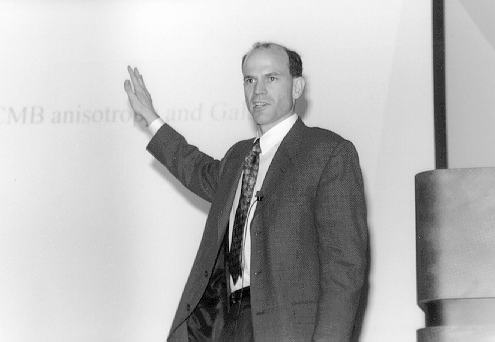
“I put a lot of work into it and everyone I knew in my field that was eligible was also doing that and sharing their stuff. So just the application really made an impact in the field,” Carlstrom said. “But it was both fun and stressful to have to write a big essay like that at the time.”
The unusual grant application suited Dr. Daniel Povinelli, an expert in animal cognition who also happens to be a fiction writer. Povinelli enjoyed taking a step back and presenting the work he’d been doing for the past several years in a way that was truly accessible. “Who doesn’t want to write an essay about their work?” Povinelli mused.
Dr. Keith Wailoo, who won in the category of the history and philosophy of science, described the application process as “quite exciting and completely novel” and added that a no-strings attached fellowship was “totally unusual” for his field.
For Wailoo, the best part of applying was having to conceptualize a project that could be interesting enough to sustain 10 years of research and writing on a topic. Ultimately, he focused on the history and cultural politics of the biomedical sciences, encompassing four distinct themes: vaccines and transplants, cancer, genetics and genetic disease, and pain.
Announcing the Awards
When the leaders of JSMF arranged a call with Povinelli and the president of the University of Louisiana at Lafayette, Povinelli’s entire staff crowded into his office. Because they filmed their chimpanzee studies, there were cameras everywhere, so a staff member picked one up and started recording. Povinelli found himself temporarily unable to breathe.
“It was tremendous,” Povinelli said of being selected for the fellowship. “It leveraged a lot of credibility for a lot of other donors and people that were in the local community here that were providing support for a lot of the expansion of our testing facilities. It was quite a day.”
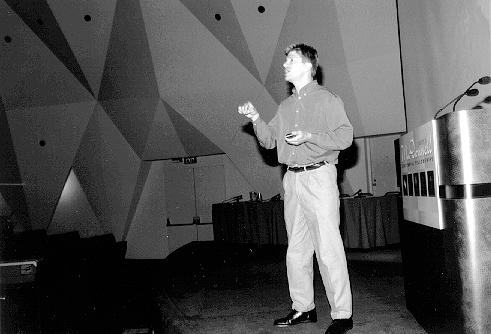
Carlstrom, the astrophysicist, also remembered how he felt hearing the news that he’d been selected for one of the $1 million prizes: “I was thrilled and kind of amazed at the same time because I had known all these other people who had applied, who I looked up to, and yet somehow, I was selected. So, it was a big honor.”
For Wailoo, a prize of that magnitude was transformative. It compelled him as a historian who was used to working alone to instead think collaboratively, building research teams that encompassed a network of 30 students over the course of 10 years.
“It’s hard to describe the full scope of the impact. It has to do from the very beginning with validation. It is such an extraordinary award in terms of the scope of the resources that it immediately gets you a ton of attention within your field, especially in my field because of how unusual it is,” Wailoo said. “I could say that it’s field-changing in some ways.”
A Symposium Celebration
In April 1999, the fellows gathered in Washington, DC, for a symposium at the National Academy of Sciences on the centennial of James S. McDonnell’s birth. They presented on their research and joked to the press about how each of them planned to spend their $1 million — a down payment on a telescope, a more powerful microscope for genetic research, a ton of bananas for Povinelli’s chimpanzees, and a mountain of pencils for Wailoo to take notes at the library.
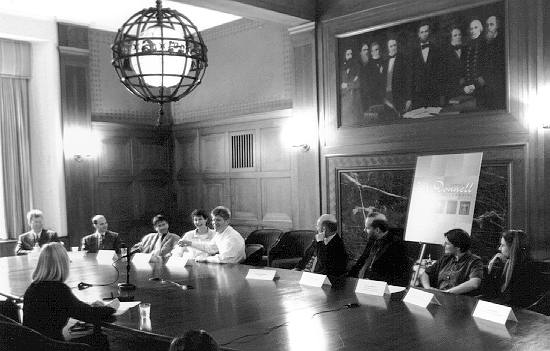
“Mostly what I remember is the spirit of camaraderie and learning about the different projects and learning that a grant of this dimension, what it can do varies dramatically from one field to the next,” Wailoo said. “I think it was there that it dawned on me that my undertaking would be … transformative in the sense that it pulls me out of a conventional mode.”
During the symposium, John F. McDonnell delivered a tribute about his father’s life and career that provided context for the forward-thinking fellowships. The talk addressed Mr. Mac’s longstanding interest in areas like human genetics and the workings of the mind, while serving as a reminder of the responsibility that comes with scientific advancement.
“That’s a fascinating legacy to leave and to try to plant seeds to spur on. Which is what the McDonnell Foundation in that incarnation was all about, really trying to find places to invest strategically, not to provide funding for research that was already being done,” Povinelli said. “A little investment on the kind of scale that the McDonnell Foundation could provide would spark maybe a new wave of interest in some topic.”
Carlstrom felt privileged to be among the other scientists and thought their talks at the symposium were amazing. For his own presentation, he showed a picture of a massive telescope that was currently under construction at the South Pole — that telescope ended up taking the first polarized images of the cosmic microwave background, among other breakthroughs supported in part by the McDonnell award.
“We’re looking at the very beginning of our universe,” Carlstrom said. “The neat thing about astrophysics and even cosmology is that you can bring people with no background to the very edge of our understanding. It’s mind-exploding, just that we’re able to do this.”
Legacy of the Awards
One of the most important aspects of the fellowships was the autonomy they provided to recipients. For Povinelli, that meant the opportunity to take a step back and come to a deeper understanding the challenges underlying experimental design in his field of animal cognition.
“Probably the thing that the McDonnell award offered me the most was the freedom to explore not just the everyday run-of-the-mill science that we were doing … but the space for me to think more clearly about the everyday science. … Is this getting anywhere, or are we stuck in a loop?” Povinelli said, “And it allowed me to develop the mathematical formalisms to show to philosophers and other scientists exactly what the fundamental problem was, not just verbally, but mathematically.”
Wailoo, the historian, has found that picking the right topics to write about not only informed people about historical insights but also centered important questions that weren’t being discussed about contemporary events and issues. As a result, he has remained at the forefront of discussions on issues surrounding science and society.
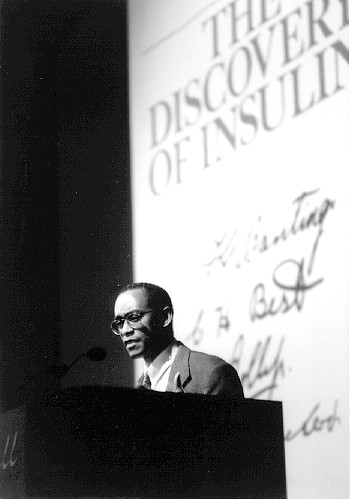
“The kind of expertise that the McDonnell Fellowship has allowed me to cultivate is the expertise that I’ve been called upon to talk about pandemics past and present, vaccination policy and race past and present, the opioid crisis past and present, and you name it,” Wailoo said. “That’s ultimately how it has helped me and helped transform the people that I’ve created a network with.”
In the 25 years since the Centennial Fellowships were awarded, Carlstrom shared that his field has matured, research teams have grown, and technology has advanced, allowing researchers to make increasingly subtle discoveries. In particular, the number of detectors in the telescopes they use have skyrocketed from half a dozen to 16,000.
“We’re asking tougher questions now. We’re looking for this faint signature in the cosmic microwave background from essentially the dawn of time from whatever inflated the universe,” Carlstrom said. “Instead of measuring things to a part in a millionth precision, we’re now trying to do about a part in a billionth precision. Everything has gotten more sophisticated.”
Carlstrom is also working on empowering the next generation to continue seeking knowledge about the origin of the universe, and he feels that additional discoveries are just around the corner. “Science doesn’t end,” he said. “This ‘end of science’ stuff — it doesn’t end. It’s exploding and it’s exciting.”
In their introduction to the book of scientific essays by the centennial fellows, JSMF leaders John Bruer and Susan Fitzpatrick offered a reminder of how JSMF has always worked to improve quality of life:
We should not forget that the original vocation of American-organized philanthropy was to invest in generating new knowledge that could be used to solve social problems. This vocation was at the core of James S. McDonnell’s philanthropic vision. … [He] believed that science and scholarship gave mankind the power to shape the future and the obligation to shape that future in a responsible manner, to the benefit of all.
